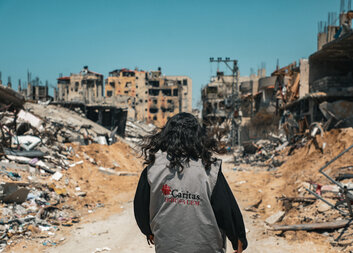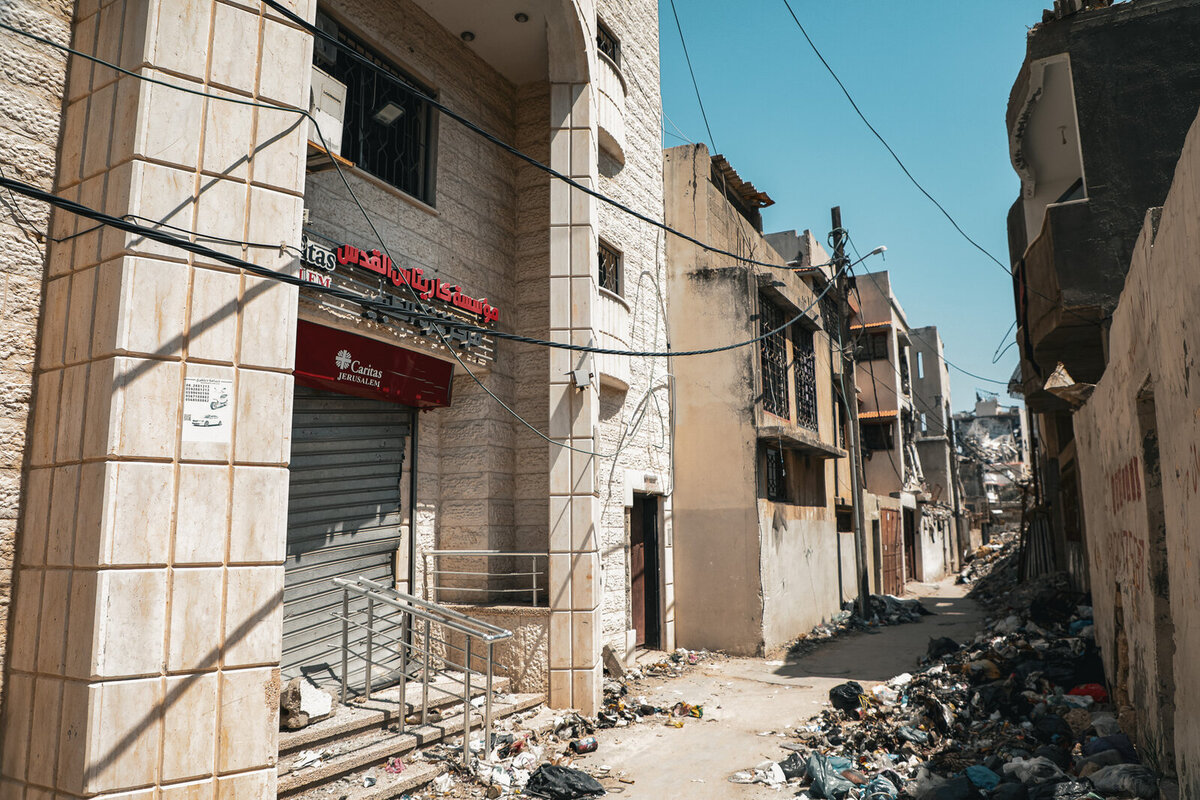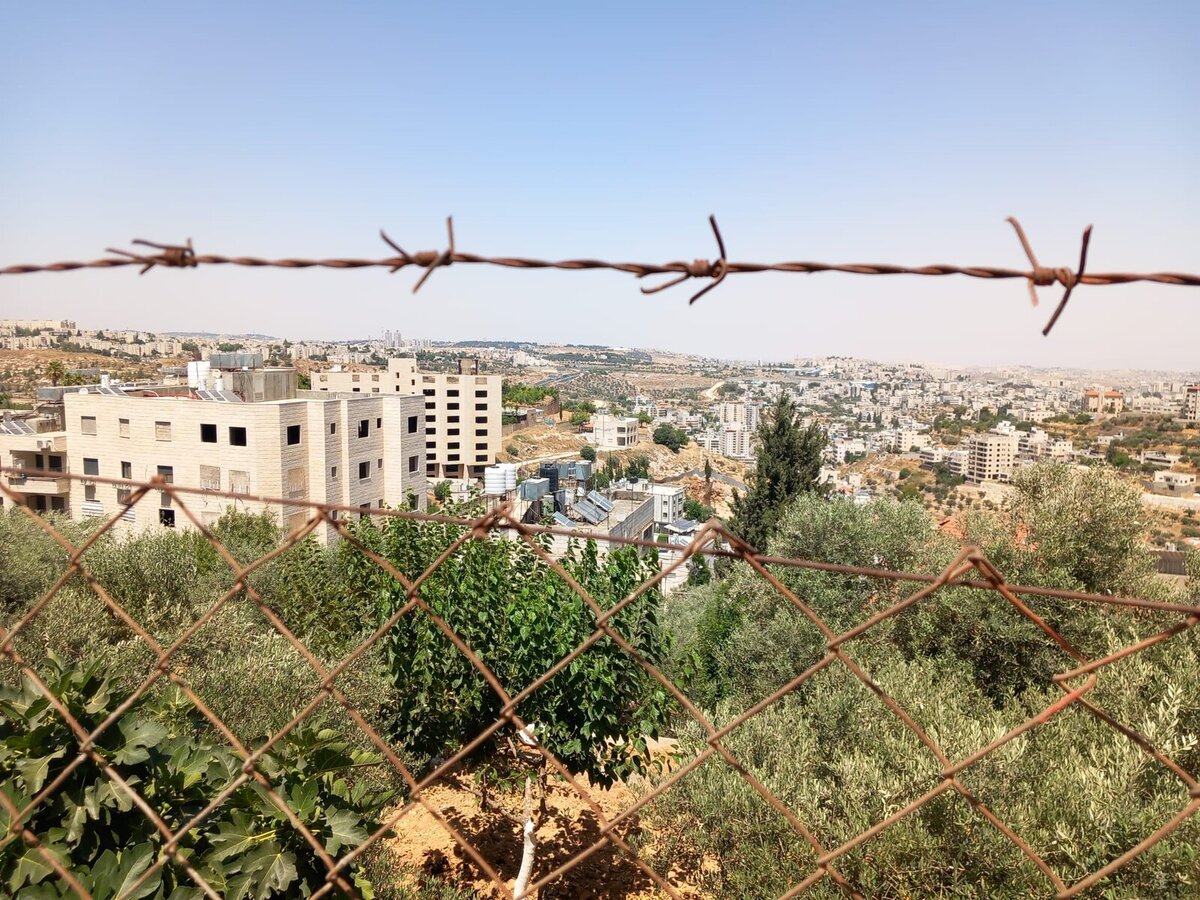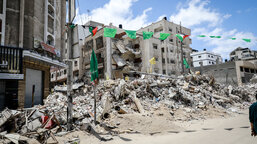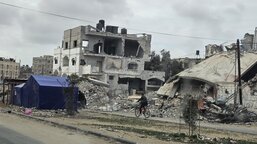The devastating war in Gaza has been going on since the beginning of October last year. It has left behind an indescribable level of destruction and suffering and has had a major impact on local civilians. The fighting in this closed strip of land has caused one of the greatest humanitarian disasters. What is the situation in Gaza? What do people need the most? How is Caritas helping? Our colleague Kateřina Velíšková, who recently returned from Israel, explains this in an interview.
You have recently returned from a work trip to Israel, where you met, besides other things, the staff of Caritas Jerusalem, which has been helping in the Gaza Strip for a long time. What is the situation in Gaza now and what do people need the most?
The situation in Gaza stays critical. The biggest problem is the constant fighting in the south in the Rafah area, which complicates the transport of humanitarian help. Most of the displaced people have moved from this area to the centre of Gaza. However, the conditions for providing help and basic needs to them are even worse here than in the south. Caritas is trying to deliver help through the northern way, but it is very difficult.
You mentioned that people do not have enough basic needs. How do people in Gaza currently live and what problems are they dealing with?
Almost all people in Gaza have had to leave their homes. As a result, they do not have easy access to basic needs such as food, clean drinking water, proper sanitation or quality health care. Besides that, local children do not have the opportunity to go to school and continue their education.
Most people try to live in these difficult conditions somehow. Some live in former schools, hospitals or clinics together with a large number of other people. Some live in tents, which is not ideal due to the high temperatures in Gaza. Those who have more financial means try to escape Gaza via Egypt, but only a very small percentage succeed.
The main problem remains the lack of health care and the impossibility of hospitalisation. Not to mention the fact that people are still dying in air strikes.
The war in Gaza has displaced 1.9 million people from their homes. Half of them are children. How is Caritas helping these people?
In Gaza, we are cooperating with Caritas Jerusalem, with whom we had good relations even before the war. Caritas has approximately 75 staff inside Gaza, the majority of them are doctors, nurses or pharmacists. They are divided into 12 medical teams, 11 of which are in south of central Gaza where most of the displaced people are. One team is still directly in Gaza city, where the main Caritas Jerusalem centre and also the main health centre were originally located. However, it is damaged now and colleagues are trying to rebuild it. They have recently reopened a health centre in central Gaza as well.
Help to people is often provided from tents or makeshift shelters, where Caritas teams treat minor injuries and chronic illnesses. But they also engage in psychosocial support, such as activities for children traumatised by the situation in Gaza. The plan is also to provide psychosocial support to frontline workers so that they can manage to work in difficult conditions while looking after themselves.
The great majority of people in Gaza depend on humanitarian help. What can be done to help them?
There are several options. There are a large number of organisations working in Gaza to deliver help such as food, health care or hygiene kits. Caritas Czech Republic has also launched a humanitarian collection directly for Gaza. The proceeds go towards the much-needed help for the people in Gaza, provided in cooperation with Caritas Jerusalem.
Donate to help civilians in Gaza
You must have heard many distressing stories during your trip. Would you mind sharing some of them with us?
Unfortunately, a large number of humanitarian workers have died in Gaza, including two employees of a local Caritas. Our colleague from Caritas Jerusalem, Viola, her children and husband were also killed in the air strike on St. Porphyrios Church. We are trying to support her mother, who lost both her daughter and three grandchildren. But what we are able to offer her unfortunately cannot make up such a big loss.
You visited Jerusalem, what was the purpose of your trip? Can you give us your impressions of the situation in the region?
The goal was to visit our colleagues from Caritas Jerusalem in person and discuss the details of the project we are planning to further help the people in Gaza. We also wanted to coordinate humanitarian aid with other NGOs or UNO agencies. Together with my colleague, we also visited the Czech Embassy and the Czech Liaison Office for the Palestinian Territories.
Intense attacks are taking place all over Gaza, including hospitals, schools, churches and other civilian buildings. How hard will post-war reconstruction be?
That is a tough question. So far, there are only estimates of how long the post-ware reconstruction will take. In the current situation, no one knows when the war will end, what will happen the day after and who will manage Gaza. Just clearing the ruins of buildings that have been hit or completely destroyed could take several years, not to mention the large amount of unexploded bombs and mines. The infrastructure and local roads are also damaged and need to be made functional. Besides that, no one knows what the situation will be with the political and state administration.
Is there anything else you would like to mention or add in relation to Gaza?
The West Bank has also been badly affected by the situation, which has had an impact on Jerusalem as well. Because of the war, the tourists which were hundreds of thousands normally are not going there. For example, Bethlehem has been hit economically. It has lived mainly on tourism. Many stores are closed, people have no source of income, and the situation is even worse in the West Bank. For people who used to go to Israel for work, permits are stopped or severely restricted. Many of them have lost their jobs. Among other things, violence between people from Jewish settlements and Palestinians has increased in the West Bank.
Thank you to all those who join us in helping civilians in Gaza by contributing to the Caritas for Gaza appeal.
DONATE TO HELP CIVILIANS IN GAZA

